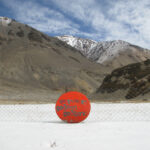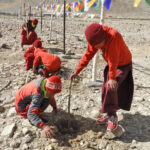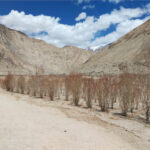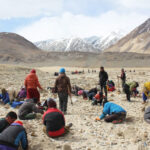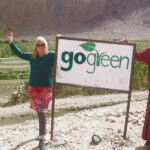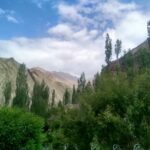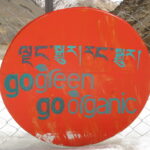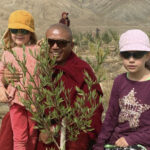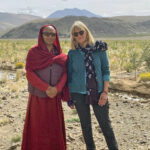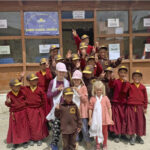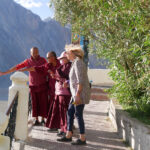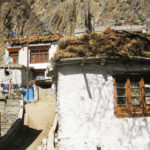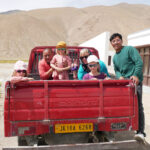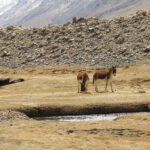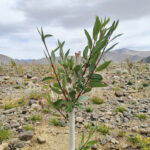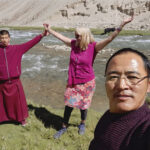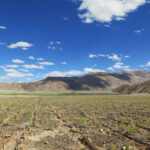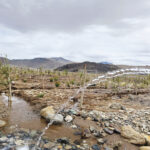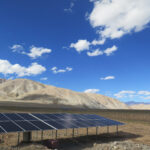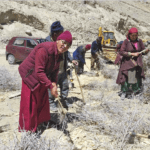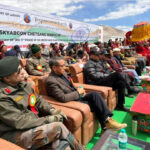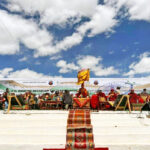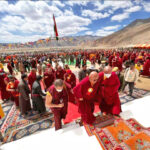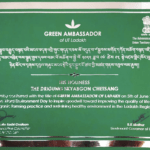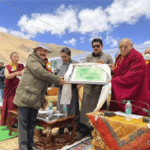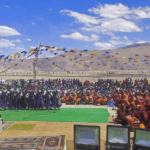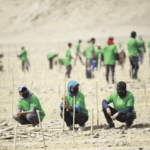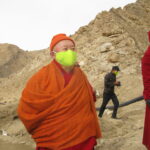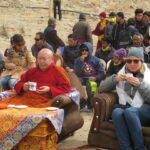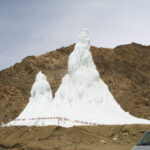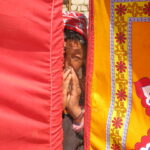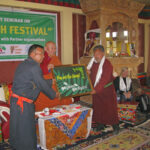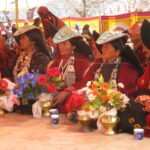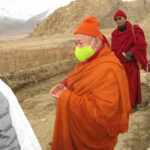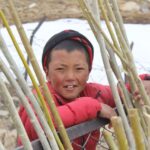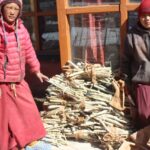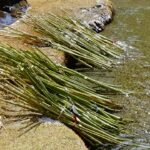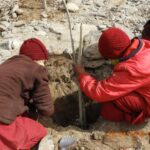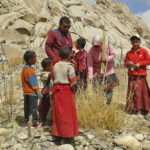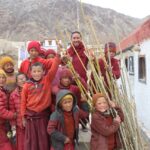tree plantings
Mahamaya e.V. is currently supporting
>> GoGreen GoOrganic << in Chushul
Environmental organization in Ladakh, Himalayas, North India
His Holiness Drikung Kyabgon Chatsang Rinpoche started the project in 2014 with two main goals:
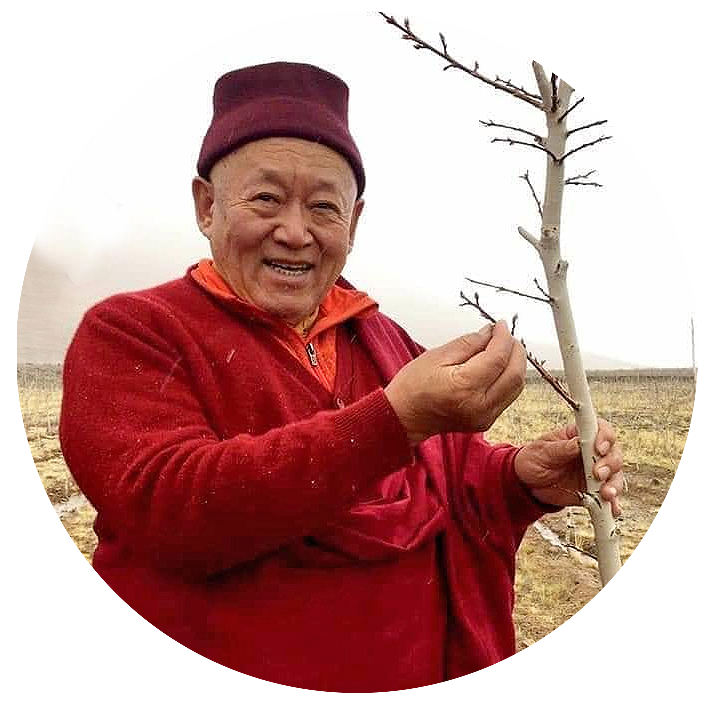
GoGreen:
Preservation of the fragile and unique ecosystem of Ladakh through large-scale planting of trees.
GoOrganic:
Promotion and support of traditional environmentally friendly practices in Ladakhi agriculture
and animal husbandry to preserve the rich traditional knowledge of the land.
2022 - Susanne Mic at the GoGreen GoOrganic Chushul tree planting
Mahamaya e.V. supports the 11th phase of planting in the Chushul area –
directly on the Tibetan border.
In June 2022, 150,000 poplar, willow and apricot seedlings were planted in Chushul, Ladakh, in the highest settlement area on earth. The Nepalhilfe Aachen and the Mahayama Drikung Förderkreis e.V. provided financial support for the absolutely necessary irrigation of the seedlings. These trees are not wood suppliers! They are vital to the residents, intended to stabilize the soil, provide nourishing fruit, provide shelter for goats and yaks, and enable the cultivation of vegetables. The nomads take part in the arduous planting campaign with great humility. Hundreds of thousands of trees have been successfully planted in this way in recent years.
2023 – Susanne Mic with the Barein family from Nepalhilfe Aachen e.V. and visit to a primary school
2022 - 5. Juni | World Environment Day
2017 - Susanne Mic bei der Umweltkonferenz »GoGreen GoOrganic«
During her visit to the environmental conference in March 2017 in the northern Indian city of Leh, which Susanne followed at the invitation of the Buddhist saint His Holiness Drikung-Kyabgon-Chetsang-Rinpoche, she got to know the ice stupa for water production. Among other things, a cooperation project between the Technical University of Munich and Indian partners was presented at this environmental conference, supported by the Bavarian Minister for the Environment, Ulrike Scharf. The Phyang Monastery of this mountain settlement in Ladakh in the Himalayas is also the summer residence of the Dalai Lama and the seat of His Holiness Chetsang Rinpoche:
“Religious leaders like myself can no longer just stay in the monastery and pray for a better world, but must also“ go into society and help people according to the needs of the twenty-first century ”. «
HH CHETSANG RINPOCHE
Shachukul Gonpa School participates in «GoGreenGoOrganic»
»With the diversity of nature, the children in the Himalayas build a sustainable ecological connection to their homeland. «
In this country we collect firewood for winter supplies. Sticks, branches, cones – everything we find on the forest floor for a good fire. The idea of collecting manure from yaks does not come to mind for many people here. It is different in the high mountain landscape of Ladakh, the land of high passes. The hospitable Ladakhi live there at an altitude of approx. 5000 meters and the second highest passable pass on earth is located here at 5200 meters. Meaning of “GoGreenGoOrganic” The contact with Ladakh began in the winter of 2015 when I found out about the school from North India in Regensburg. At that time I spoke to the UN’s World Mountain Ambassador, His Holiness Drikung-Kyabgon-Chetsang-Rinpoche, about the environmental problems that prevail in their country and about the “GoGreenGoOrganic” project, for which the people living there are strongly committed. To get a better idea, Ladakh is a high mountain desert whose glaciers are melting drastically. The monsoon is held off by the Himalayas to move to Ladakh as well. That is why Ladakh has very little rainfall and is very dry. The melt water and the glacier water form the irrigation basis for the fields. The “GoGreenGoOrganic” project supports the planting of trees there in the Changthang valley. Because the trees are vital for the nomad people.
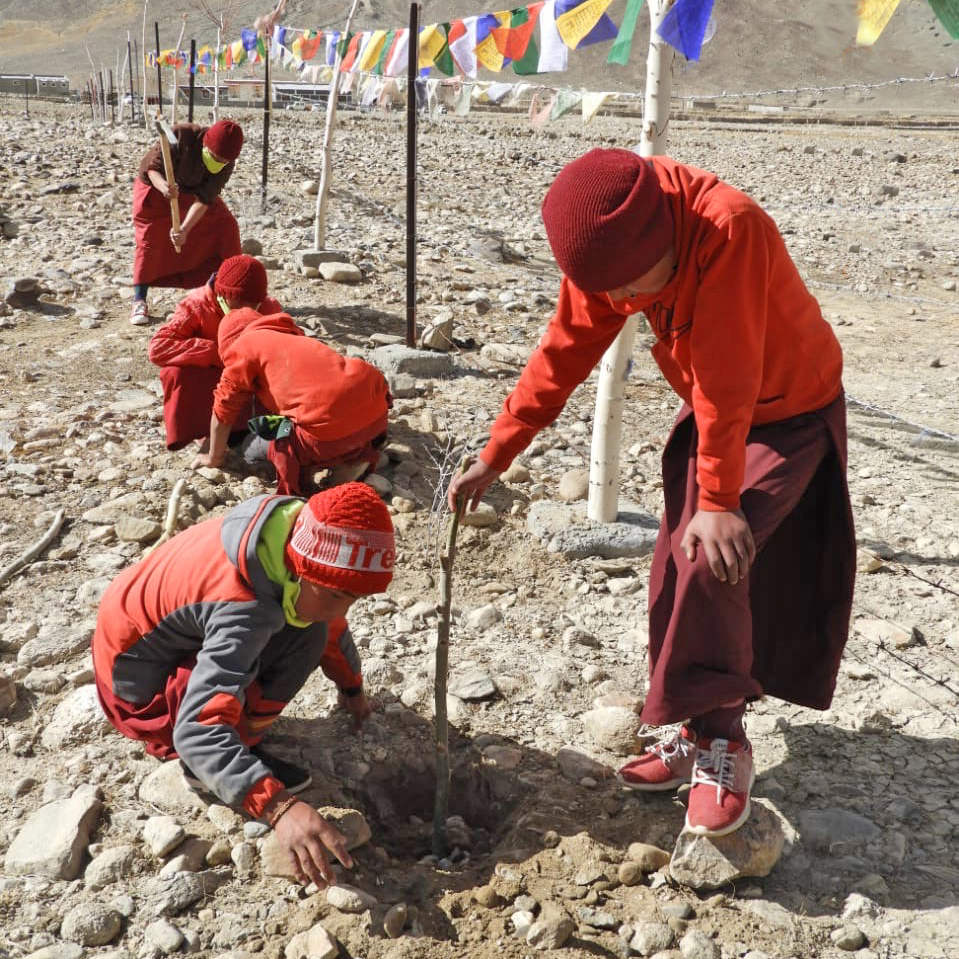
Nomad children attend the Buddhist school
This time I was able to visit the family of the Changpa nomads of my godchild Rigzen. They live in tents and simple dwellings. It’s so lonely out there that the other Ladakhis only call you “somewhere out there”. Your life is simple and labor intensive. Life at the Buddhist school includes living and learning together. The thirty-three exclusively boys, aged 3 to 16 years, have their own unheated bedrooms and a room for everything: school lessons, daily meals, ceremonial lessons, leisure room. People are used to traditionally sitting on the floor. The children learn arithmetic and write and become
Tibetan in the languages taught Hindi and English. The girls from the area have their own monasteries and go to school there. The school attendance of the children is very important for the country, because it increases the chances that they can make their way through life with education for their country. There are children for whom it makes sense to go to secondary schools and Buddhist universities. However, many of the children also stay in the monastery and continue their life there. Because it is of no use to the country if the majority of their children have a high academic education, but they are no longer familiar with cultivating the earth of their homeland. Survival in the valley is only possible with tree planting The nomadic peoples only have a chance to continue to live in this valley if they have water. The “GoGreen GoOrganic” project is already showing its first successes due to tree planting in the high mountain desert. For some, it may be astonishing that willow, sea buckthorn and apricot trees grow very well at an altitude of 4800 meters. In a neighboring valley they grew 8 different types of apricots. In addition to the high vitamin content of the sea buckthorn trees, which benefits people’s health, the trees also offer them an economic basis. The sustainability of the trees’ planting also flows into the lessons.
»When the ice on the Himalayas melts,
that concerns us all, also here in Europe. «
Susanne Mic
